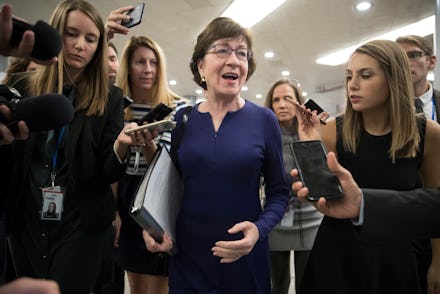Sen. Susan Collins makes her demands clear for the Republican tax bill

With the House of Representatives passing the Republicans’ tax reform bill Thursday, all eyes are now on the Senate — and the senators who could potentially stop it from passing.
In an interview Sunday on CNN’s State of the Union, Sen. Susan Collins (R-M.E.), one of the key votes on the Senate tax bill, made it clear what she wants for the sweeping legislation — but did not go so far as explicitly saying she would vote against the bill if those demands aren’t met.
When asked by host Jake Tapper about her opposition to the bill’s provision that strikes the individual mandate in the Affordable Care Act requiring Americans to purchase a health care plan, Collins said that she didn’t agree with the provision being in the bill.
Collins distinguished between “taking away health care from people who already have it” versus “removing a fine on people who choose not to have insurance” in her discussion on the individual mandate, but she added that she did not “think that provision should be in the bill” nevertheless.
“I hope the Senate will follow the lead of the House and strike it,” Collins said. If the provision is not struck from the bill, however, Collins did not say the bill would not earn her vote. Instead, she called on Congress to pass the Alexander-Murray health care bill and a bill Collins introduced with Sen. Bill Nelson that would create high-risk health care pools.
“The fact is, if you do pull this aspect of the Affordable Care Act out, for some middle-income families, the increased premium is going to cancel out the tax cut they would get, and that’s why it’s so important that we pass the two pieces of legislation that I’ve talked about, and it’s also why we have to restore the tax deduction for state and local taxes, the way that the House did,” Collins said on CNN.
In addition to the ACA mandate, Collins also pointed to her desire to see the tax bill “provide relief to middle-income families.” When asked by Tapper whether or not receiving that additional relief would mean she’d vote against the bill, Collins seemed hopeful that amendments would be filed to the Senate bill addressing her concerns, rather than explicitly saying she could potentially vote no.
Collins also disagreed with detractors of the bill who say that it disproportionately benefits the rich, telling Tapper, “It benefits people of all tax brackets, but what I want to do is skew more of that relief to middle- and low-income families.
“The Senate bill starts to do that,” Collins added, citing the bill doubling the child care tax credit from $1,000 to $2,000 and doubling the standard deduction, meaning some low-income Americans wouldn’t pay income taxes at all.
Collins also expressed a desire to see the tax rate stay at its current place for Americans earning $1 million or more per year “rather than lower it, as the Senate bill would do.” She said she does not believe there should be as large a reduction in taxes on businesses as the Senate bill currently stipulates.
“So I don’t think those allegations are fair,” Collins said of criticisms that the bill benefits the richest Americans, “but nevertheless, there are provisions of the bill that I would like to see changed.”